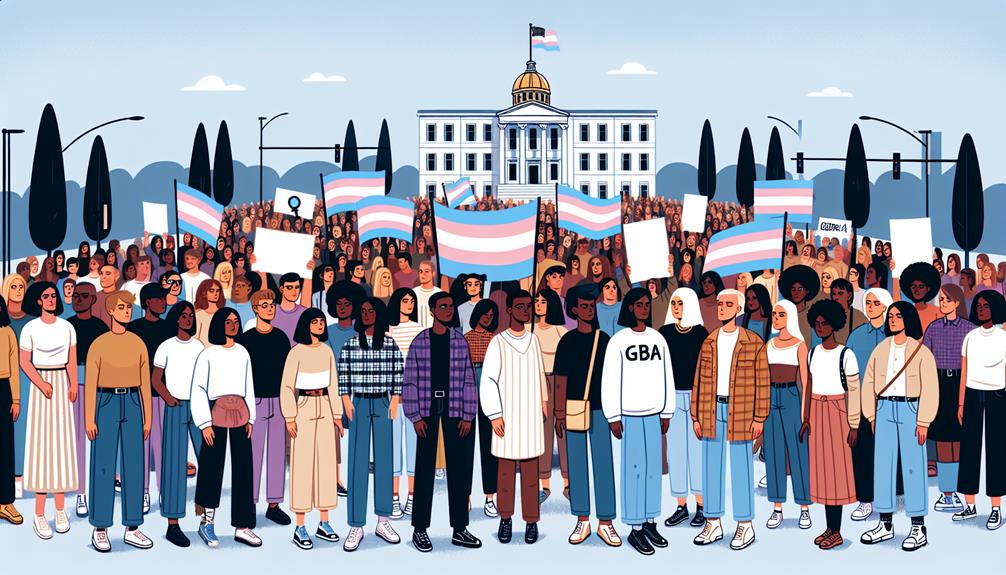Georgia Transgender State of Affairs


Table of Contents
ToggleAmid ongoing legal battles over transgender rights in Georgia, the debate surrounding restrictions on gender-affirming care for transgender youth has sparked a nationwide conversation.
Georgia’s state law, Senate Bill 140, prohibits licensed medical professionals from providing cross-sex hormone therapy to patients under 18, with severe penalties for non-compliance. This has led to a legal challenge by four transgender youth and their families, along with an advocacy group, arguing that the law restricts access to essential gender-affirming care for transgender minors.
A federal judge has temporarily blocked parts of Georgia’s ban on gender-affirming care for transgender youth, citing potential harm including risks of depression, anxiety, self-harm, and suicidal ideation. The law hasn’t only sparked a nationwide debate on restrictions to gender-affirming care for trans youth but has also resulted in at least 20 states implementing similar limitations.
These legal challenges aim to protect the rights and well-being of transgender youth. Pending developments in the Alabama case could potentially affect the outcome of the Georgia ban, signifying the broader impact of these legal battles on transgender rights and access to healthcare for minors.
Policy changes impacting transgender individuals have brought significant legal and societal implications to the forefront of public discourse. In Georgia, Senate Bill 140 prohibits licensed medical professionals from providing cross-sex hormone therapy to patients under 18, carrying criminal and civil penalties for non-compliance. This has led to a legal challenge from transgender youth, their families, and an advocacy group, arguing that the law restricts access to gender-affirming care for transgender youth. Despite this, a federal judge temporarily blocked parts of the ban, citing potential harm to transgender youth, which was upheld by an appellate court.
As a result, transgender youth in Georgia may face limited access to gender-affirming care, and healthcare providers may face penalties for providing cross-sex hormone therapy to minors. The Georgia court is currently awaiting further developments in the Alabama case before reconsidering the legal challenge to SB 140. In the meantime, advocacy groups continue to fight for the rights of transgender youth and access to gender-affirming care in the state.
| Policy Changes Impacting Transgender Individuals | Georgia | Healthcare Providers | Transgender Youth |
|---|---|---|---|
| Senate Bill 140 prohibits cross-sex hormone therapy for minors | Legal Challenge | Limited Access to Gender-affirming Care | Ongoing Advocacy Efforts |
Transgender individuals in Georgia often encounter societal attitudes that impact their experiences and access to gender-affirming care. The state’s ban on cross-sex hormone therapy for minors under SB 140 has sparked a nationwide debate on restrictions to gender-affirming care for trans youth.
This law not only limits access to essential healthcare but also creates a barrier to proper care for transgender adolescents. Healthcare professionals and families are at the forefront of these challenges, as they navigate the legal landscape to ensure the well-being of transgender youth.
Moreover, the ban on hormone therapy for transgender youth isn’t supported by research, standards of care, or clinical expertise, further complicating the experiences of transgender individuals in the state.
The broader societal discussions on transgender rights and healthcare access are reflected in the legal challenges and lawsuits filed to protect the rights and well-being of transgender youth. While these legal battles continue, it’s crucial to acknowledge the importance of age-appropriate gender-affirming care, as supported by every credible medical organization.
Understanding and addressing the societal attitudes that impact transgender experiences is essential for creating a more inclusive and supportive environment for transgender individuals in Georgia.
Despite the legal challenges and societal debates, transgender youth in Georgia are showing remarkable resilience and activism in advocating for their right to access gender-affirming care. Many have joined advocacy groups, speaking out against the recent legal challenges to restrict hormone therapy for trans youth. Their stories of resilience and activism are inspiring, showcasing their determination to fight for their rights and well-being.
Transgender youth in Georgia have organized peaceful protests and rallies, raising awareness about the importance of gender-affirming care and the potential harm caused by restrictive legislation. These efforts have garnered support from allies within the community, including medical professionals, educators, and local leaders, amplifying their voices and advocating for inclusive policies.
Some transgender youth have shared their personal experiences through social media and public forums, shedding light on the positive impact of gender-affirming care on their mental health and overall well-being. Their willingness to speak openly about their medical decisions and challenges has humanized the issue, fostering empathy and understanding among the broader public.
Despite facing adversity, transgender youth in Georgia remain resilient and committed to creating a more inclusive and supportive environment for themselves and future generations, serving as beacons of hope in the face of legal and societal obstacles.
Amid the ongoing legal and societal debates surrounding gender-affirming care for transgender youth in Georgia, significant progress and challenges continue to shape the experiences of this community.
Georgia’s Senate Bill 140 has sparked a heated debate, with the ban on cross-sex hormone therapy for those under 18 drawing national attention. However, a federal judge’s decision to temporarily block parts of the ban has provided a glimmer of hope for transgender youth in the state. Despite this, challenges persist as healthcare providers face the risk of legal consequences for providing gender-affirming care to minors.
The ban has sparked advocacy efforts, with groups and individuals working tirelessly to protect the rights of transgender youth in Georgia. The outcome of the legal challenge and the developments in the Alabama case carry significant weight, as they may set a precedent that could impact the future of gender-affirming care for trans youth in Georgia.
The community continues to navigate these complex and emotionally charged issues, striving for progress while facing the challenges posed by the current legal landscape.
Transgender individuals in Georgia face legal challenges related to access to healthcare, discrimination, and gender marker changes. These issues are being addressed in the court system through advocacy and legal battles aimed at protecting their rights.
Judges are considering cases that could set important precedents for transgender rights. The outcomes of these legal battles will have a significant impact on the lives of transgender individuals in Georgia and potentially beyond.
Recent policy changes in Georgia have had a significant impact on access to healthcare, housing, and employment for transgender individuals. These changes have created barriers, making it more challenging for transgender individuals to receive necessary medical care, find safe and affordable housing, and secure employment opportunities.
The situation can be likened to trying to navigate a maze with constantly shifting walls, creating uncertainty and additional obstacles for transgender individuals seeking these essential resources.
Societal attitudes towards transgender individuals in Georgia can vary widely. Some people are accepting and supportive, while others hold negative stereotypes and prejudices.
These attitudes can impact transgender individuals’ daily experiences by influencing their access to healthcare, housing, and employment opportunities, as well as their overall sense of safety and belonging in their communities.
It’s important to address and challenge these attitudes to create a more inclusive and supportive environment for transgender individuals.
One inspiring story comes from a transgender activist in Georgia who’s made a difference in the community. Their tireless efforts have raised awareness and advocated for the rights of transgender individuals.
Through resilience and activism, they’ve set an example for others and contributed to positive change. Their work has helped create a more inclusive and supportive environment for the transgender community in Georgia.
Ongoing challenges for the transgender community include discrimination, lack of access to healthcare, and higher rates of violence.
Progress has been made in raising awareness and advocating for policy changes to protect transgender rights. However, there’s still work to be done in creating inclusive environments and ensuring equal opportunities for transgender individuals.
It’s important to acknowledge the progress made while recognizing the continued need for support and advocacy.
As legal battles over transgender rights continue in Georgia, the future remains uncertain for transgender youth seeking gender-affirming care. While some progress has been made in the fight for equality, the challenges and obstacles are still prevalent.
The resilience and activism of the transgender community serve as a beacon of hope amidst the societal attitudes and policy changes impacting their experiences. The juxtaposition of progress and challenges highlights the ongoing struggle for transgender rights in Georgia.
 Featured PostsJanuary 3, 2026Transitioning the Mind: The Emotional Labor of Becoming Yourself
Featured PostsJanuary 3, 2026Transitioning the Mind: The Emotional Labor of Becoming Yourself Featured PostsJanuary 2, 2026Beyond Barriers: The Resilient Journey of Transgender Youth
Featured PostsJanuary 2, 2026Beyond Barriers: The Resilient Journey of Transgender Youth Activism and ChangeJanuary 2, 2026The Price of Safety: Fleeing Anti-Trans Laws in the Lone Star State
Activism and ChangeJanuary 2, 2026The Price of Safety: Fleeing Anti-Trans Laws in the Lone Star State Featured PostsDecember 31, 2025Beyond the Headlines: The Full Impact of New Anti-Trans Laws
Featured PostsDecember 31, 2025Beyond the Headlines: The Full Impact of New Anti-Trans Laws